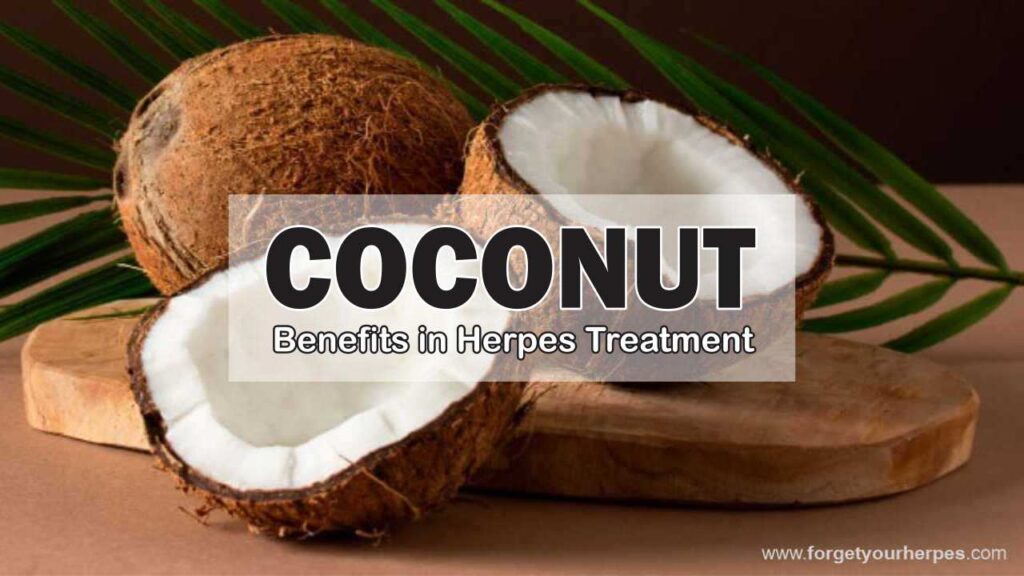Coconut and Herpes: Benefits in Natural Herpes Treatment
Coconut is a versatile and nutrient-rich food that can be incorporated into the diet as part of a complementary treatment for herpes. Below are some relevant topics regarding the use of coconut in herpes treatment.
Studies on Coconut in Herpes Treatment
While there are some studies suggesting benefits of coconut in herpes treatment, it is important to note that these studies may not be conclusive or may have limitations. Some relevant studies on the use of coconut in supporting herpes treatment include:

A study titled “Inactivation of HSV-1 and HSV-2 by fatty acids and monoglycerides” was published in the journal “Antimicrobial Agents and Chemotherapy” in 2001. In this study, researchers investigated the effect of fatty acids and monoglycerides on the inactivation of herpes simplex virus type 1 (HSV-1) and type 2 (HSV-2).
Coconut contains a specific type of fatty acid called lauric acid, which was the focus of this research. Scientists tested the ability of lauric acid and other fatty acids present in coconut to inactivate herpes viruses. They found that these fatty acids can help inhibit the growth and replication of HSV-1 and HSV-2 viruses.
This research suggests that the fatty acids present in coconut, such as lauric acid, may have antiviral properties that could be useful in herpes treatment. However, it is important to note that this study was conducted in a laboratory and not in humans.
Therefore, further research is needed to better understand the effectiveness and safety of using coconut in herpes treatment in humans.
Another study titled “Coconut Oil: A Review of Potential Applications” was published in the “Journal of Clinical and Experimental Dermatology Research” in 2018. In this research, the researchers conducted a review on the potential applications of coconut oil.
The study examined various properties of coconut oil and its potential use in different areas. The researchers highlighted that coconut oil has antimicrobial properties, which means it can help combat microorganisms, including bacteria and fungi.
Additionally, the study also mentioned that coconut oil has moisturizing properties and can help soften the skin. This can be beneficial for people suffering from dermatological conditions such as dry skin or eczema.
However, it is important to note that this study was a general review and did not specifically focus on herpes treatment, but it can be an alternative.
Benefits of Coconut in Herpes Treatment
While there is no definitive cure for herpes, some benefits of coconut can be useful as a complement to conventional treatment to alleviate symptoms and promote faster healing of lesions. Here are some benefits of coconut in herpes treatment:
Antiviral Properties
Coconut contains lauric acid, a type of saturated fatty acid that has antiviral properties. Studies suggest that lauric acid present in coconut can inhibit the growth of the herpes simplex virus, responsible for oral and genital herpes.
Anti-Inflammatory Action
Herpes can cause inflammation and discomfort in the affected area. Coconut contains anti-inflammatory compounds such as phenolic acid and cinnamic acid, which can help reduce inflammation and alleviate symptoms associated with herpes.
Skin Hydration
During a herpes outbreak, the skin can become dry and cracked. Coconut is rich in healthy fats such as medium-chain triglycerides, which help hydrate and soften the skin, promoting faster healing of lesions.
Immune System Strengthening
A strong immune response is essential to fight the herpes virus. Coconut contains nutrients such as vitamins C and E, which can help strengthen the immune system and improve its ability to fight viral infections.
Symptom Relief
Topical application of coconut oil can provide temporary relief from herpes symptoms such as itching, pain, and burning.
How to Use Coconut in a Herpes Treatment Diet
Coconut can be incorporated into the diet as part of a complementary treatment for herpes. Here are some ways to include coconut in a herpes treatment-focused diet:
Fresh coconut consumption
Add fresh coconut pieces to salads, yogurts, smoothies, or enjoy it as a healthy snack. Fresh coconut contains all the beneficial nutrients such as fatty acids and antioxidants.
Coconut Oil
Coconut oil can be used for cooking as a substitute for other vegetable oils. It adds flavor and also provides the benefits of the fatty acids present in coconut.
Coconut Milk
Use coconut milk in recipes such as sauces, soups, smoothies, or cereals. Coconut milk adds creaminess and flavor while providing the nutrients of coconut.
Coconut Flour
Coconut flour can be used as a substitute for traditional flour in bread, cake, and cookie recipes. It adds extra fiber and nutrients to the preparations.
Coconut should consume as part of a balanced diet that includes a variety of healthy foods. People should remember that there isn’t a specific recommended dose of coconut for herpes treatment. It’s important to listen to your body and adjust the amount according to personal preferences and individual tolerance.
Sumary
Coconut can be used as part of a complementary diet in herpes treatment due to its potential benefits. Lauric acid present in coconut has antiviral properties, while anti-inflammatory compounds help reduce inflammation.
Additionally, coconut hydrates the skin and strengthens the immune system. Fresh coconut, coconut oil, coconut milk, and coconut flour can be incorporated into the diet. However, it is important to remember that coconut does not replace conventional medical treatment, and consulting a healthcare professional is essential.
References:
– https://www.ncbi.nlm.nih.gov/
– https://www.longdom.org/







